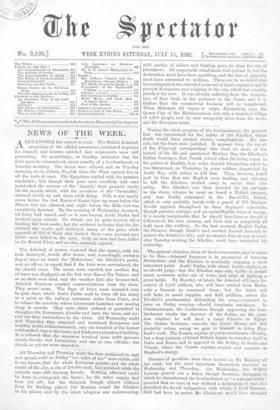During the whole progress of the bombardment, the greatest fear
was entertained for the safety of the Khedive, whose death would have created serious complications. He was safe, but the fears were justified. It appears from the report of the Telegraph correspondent who went on shore at the hazard of his life and questioned Martino Bey, the Khedive's Italian Secretary, that Tewfik retired when the firing began to the palace at Ramleh, four miles beyond Alexandria, where he was threatened, on Thursday, by some soldiers despatched by Arabi Bey, with orders to kill him. They, however, heard just in time that the English were landing, and refusing to kill the Khedive, rushed away to secure their own safety. The Khedive was then escorted by his servants to the shore, whence he went on board a British steamer, and was finally reinstated in the Ras-el-Tin Palace, which is only partially burnt, with a guard of 700 Marines. Tewfik appears throughout to have displayed admirable, though passive, courage, and an unintelligible want of energy. It is nearly inexplicable that he should have been so devoid of followers in his own country, and have lost so completely all hold upon the soldiery. To the last moment, Ragheb Pasha, the Premier, though Arabi's tool, exerted himself furiously to protect the Khedive's life ; and we suspect that at any moment after Tuesday evening, the Khedive could have reasserted his authority.


































